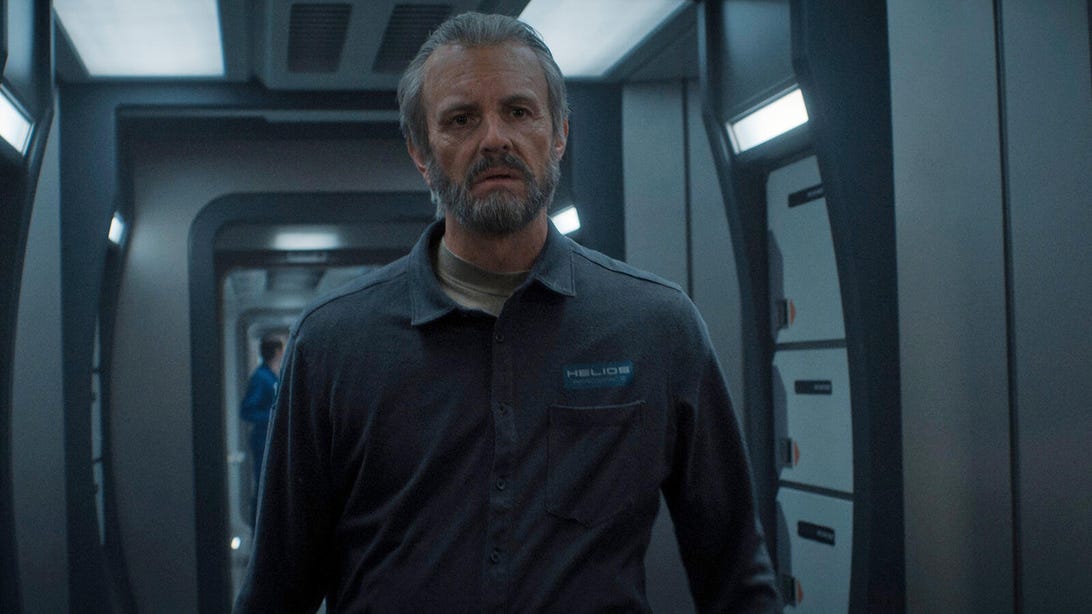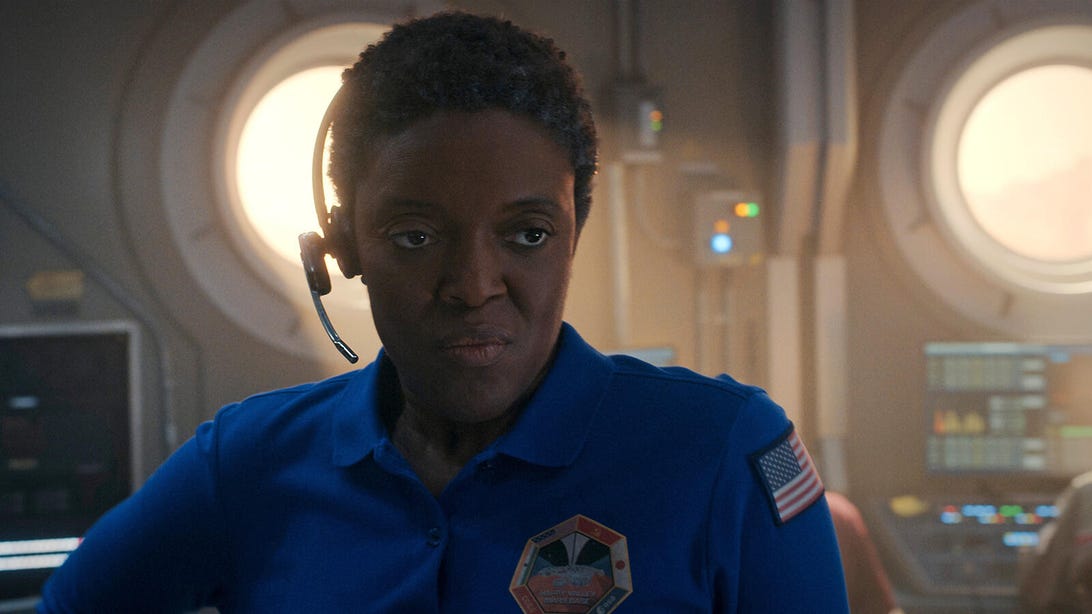Join or Sign In
Sign in to customize your TV listings
By joining TV Guide, you agree to our Terms of Use and acknowledge the data practices in our Privacy Policy.
For All Mankind's Big Fight Was Decades in the Making
Ed and Danielle's devastating argument makes the most of the space opera's time jumps

Joel Kinnaman, For All Mankind
Apple TV+Even if you've never watched Apple TV+'s sci-fi drama series For All Mankind, currently in the middle of its fourth season, you probably know some of the basics: The critical darling kicked off by delivering us into an alternate history where the Soviets were the first to land on the moon in 1969, thus propelling the Space Race into new territory; fans of the show can be brought to tears at the mere sight of a roll of duct tape (if you know you know — if you don't know, you should watch the Season 2 finale); and every season of the space opera, created by Ronald D. Moore, Matt Wolpert, and Ben Nedivi, jumps ahead almost 10 years from the prior one, giving us a sprawling, epic drama by way of both space and time.
That last tried and true For All Mankind trait is a big risk. In lesser hands, jumping to a new decade each season could easily begin to feel like a gimmick or a crutch to add some narrative juice to the story. It also means knowingly cutting off the inherent drama in some of the major events of the series. There have been times throughout the series when I've missed living in the direct aftermath of something truly compelling. Season 3, for example, ended with the bombing of JSC, in which two major characters, Molly Cobb (Sonya Walger) and Karen Baldwin (Shantel VanSanten), died. Season 4, which picks up in 2003, eight years after the bombing, shows us how some characters are still suffering from PTSD, how some never recovered, and how the loss of Karen, especially, has affected her ex-husband, Ed Baldwin (Joel Kinnaman), but it would have been interesting to see how people grappled with that tragedy immediately after it happened — not only how they coped on a personal level, but also how NASA picked itself up and got back to work. At times, it feels like we're losing out on seeing some of the good stuff.
And then there's the Danny Stevens (Casey W. Johnson) of it all. Season 3 ends with Danielle Poole (Krys Marshall) and Ed exiling their pseudo-son to the North Korean capsule on Mars as punishment after his mental breakdown led to the death of several other astronauts and he freely admitted to letting it happen. In Season 4, we learn that the astronauts and cosmonauts left on Mars after launching a pregnant Kelly Baldwin (Cynthy Wu) onto their only lifeboat home in order to save her and the baby (wow, if you're reading this without having ever watched, what a treat!), were stranded for 15 months. Things got dire. Up until this most recent episode, we've only gotten vague, concerning lines about what happened up there, or passing references about bonds formed because of that time together. Even the implications as to what took place over those 15 months are so compelling that it feels as though the time jump is once again robbing us of some meaty drama.
But in "Goldilocks," the fifth episode of the season, For All Mankind breaks form — we get flashbacks, people. Back on Mars for the first time since the first landing, newly minted Base Commander Danielle Poole is forced to confront her guilt over what went down with Danny. We get several scenes of the crew growing more and more distressed as they wait to be rescued, of rations growing smaller and smaller, and of Danielle making monthly visits to her exiled crewmate. We watch as Danielle and Ed go to the capsule only to find that the broken, guilt-ridden Danny has killed himself. It's a scene that packs an emotional wallop — a moment that needs to be seen; to have simply shown characters talking about it would have never done it justice. With the use of flashbacks here, it's almost as if the show is admitting that yes, there are some real limitations and flaws to its usual format.
And yet there are some real pros to it, as well — and not just the kicky montages that jumpstart each season, giving us the highlight reel of what's transpired over the past few years. (How else would we know that the show Moon Miners helped kick off the reality TV boom of the early 2000s?) From a storytelling perspective, it's quite enticing to jump eight years into the future. You don't get bogged down in the little details. You get to play with long-term cause and effect, seeing how events years down the road are tied to what happened in the past — something you might never get the chance to explore without a significant jump. That wider perspective can do wonders for the plot when deployed correctly and certainly adds real layers and context to the geopolitics playing out over decades.
But now, four seasons in, it's becoming clear that the greatest pro in the time jump's corner is what it does not just for an individual character's development, but for long-running character relationships. Yes, there are characters who show up for one season and then are written out, and each season introduces at least a few new characters as storylines spiral outward, but the smartest thing For All Mankind did was make sure some characters wind up sticking around for several seasons. Now, writers get to play with not just a three-year history between characters, but a 30-year one. With each passing decade, a relationship history is built that can be used for some riveting payoffs. There's no better example of this than what goes down in "Goldilocks." While I've been on the fence many times as to whether or not I am a fan of the time jump, nothing has made me appreciate it more than the final scene of the episode — an all-out gut-punch of an argument between Dani and Ed.

Krys Marshall, For All Mankind
Apple TV+Season 4 has been building to this fraught moment between the two friends: Dani is pulled out of retirement to take on the Base Commander gig up on Happy Valley mostly because no one can keep Executive Officer Ed Baldwin, who hasn't left Mars since the team first landed there eight years ago, in check; Dani might be the only one who has a chance. While her arrival is welcome (yes, they "Hi, Bob"), everything changes once Dani is forced to send a cosmonaut — with whom Ed has become quite close — Earthside to avoid an international incident with Russia. Danielle's hands are tied, but Ed implores her to find another way. Svetlana's (Masha Mashkova) dismissal leads to their first blowout in Episode 4, "House Divided." It's clear here that they know how to push each other's buttons. This isn't just a disagreement between a commander and her XO. He spits out that it's so typical that she blindly follows orders. She lays into him for once again letting his emotions get in the way of making rational decisions. They begin to yell at one another about who's to blame for what happened to Danny, and just as it's about to get out of hand, Danielle shuts it down and walks away. But the tension is still there, and in Episode 5, when Dani learns that Ed has been covering up a hand tremor and a potentially dangerous medical condition while still commanding and flying missions, it all comes to a head.
Really, this confrontation has been a long time coming. We've watched this relationship grow and change over four seasons. In Season 1, Danielle and Ed's bond is forged during the Jamestown Crisis — they're forever linked by over a hundred days trapped on the moon together, by the sacrifice they both make to save Gordo Stevens (Michael Dorman), and by The Bob Newhart Show. Over the years, that bond is tested but never broken. We've seen the two of them argue and make up. We've seen them congratulate one another and have each other's back. We've seen them get competitive. We've seen Ed say truly asinine things — the man has a knack for lashing out — and watched Danielle walk away, which is probably the only reason the bond has lasted this long in the first place. We've seen how they've always found a way to get back to "Hi, Bob" in the end. None of this is new.
At the start of "Goldilocks," it seems like maybe, with time, they'll probably follow that old pattern to forgiveness again. That is, until Danielle learns that Ed has been lying to her and putting her crew in jeopardy. At the very end of the episode, Ed finds his old friend waiting for him in his room. She tells him she knows about his hand and she has no choice but to remove his flight status; he needs to go home — it's time. As he fights against her, it becomes clear that for Danielle, this isn't just about him putting people in danger but about the fact that he lied to her. The trust between them has been broken.
That's when Ed goes for the jugular, implying she left Mars and retired because she was running away from what happened up here. When she bristles, he asks her what she could possibly do to him: "Gonna exile me to the North Korean capsule? Give me a Bible to read?" putting all the blame about Danny on her. That's the moment. That's when Danielle stops holding back. She lets out a "F--- you!" full of rage and hurt and lays into Ed for 30 years of selfishness, for walking around "like [he's] God's gift to the cosmos," and then she relieves him of his command. He's done for good this time. "Come on, Danielle, don't do anything you're gonna regret," Ed says — angrily, but with tears brimming at the edges of his eyes. "I've got a lot of regrets in my life, Ed. This ain't gonna be one of them," she tells him before walking off once more, leaving him alone in his room. But this time, it feels different. It feels irreparable. It's as if the rubber band has been stretched too many times and now it's snapped.
What makes this moment so much more emotional than simply a commander and XO fighting is, of course, this enormous history we've watched play out over four seasons. Everything we know about these two characters is stuffed in that room with them: where they butt heads, their shared trauma, how they know exactly what will hurt the most. The scene lasts less than five minutes, but thanks to Jovan Robinson's script and Krys Marshall and Joel Kinnaman's performances, you feel every single part of that 30-year friendship throughout it. It's heavy, and it's devastating. It's deeply personal in a way only two longtime friends can be, and that comes across so acutely because we've been able to catch glimpses of this relationship in various iterations across the decades. Things are certainly lost in For All Mankind's time jumps, but this scene alone proves how much can be gained from them, too.
New episodes of For All Mankind Season 4 stream Fridays on Apple TV+.